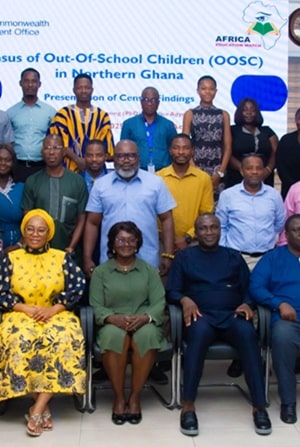
Institutional Collaboration, Partnerships With Traditional and Religious Bodies Key To Successful Re-entry Of Pregnant Girls-STAR Ghana Urges
STAR Ghana Foundation with technical support from Africa Education Watch has been engaging stakeholders in a District level Re-entry for Pregnant Girls Dialogue. The aim of the stakeholder engagement is to synergise, reinforce and scale-up local girls re-entry efforts of various agencies within the context of the Ghana Education Service (GES) Re-entry Policy.
The GES Re-entry policy for pregnant girls aims to ensure all pregnant girls have an opportunity to re-enrol and complete basic and secondary education, especially after the ten-month COVID-19 school closure. World Vision estimates that 1 million girls are likely to drop out of school due to the 10-month closure of schools in Sub-Saharan Africa. In the Central Region alone, over 3,100 pregnancies were recorded between January and June 2020 compared to 826 in the entire 2018/19 academic year. In the wake of this, a successful policy acceptance and attitudinal change in support of Pregnant School Girls and further facilitating their safe return to school, is crucial.
The first dialogue was held in the Mfantsiman Municipality on Wednesday 24thFebruary 2021,with the second taking place in the Upper Manya district on 26Tth February 2020. The two districts have a high prevalence of teenage pregnancy. In Mfantsiman for instance, close to 15% of pregnancies are teenage.
Appreciating that the 10-month closure of schools has led to an increase in the number of pregnant girls in school, the dialogues identified the leadership of traditional authorities and religious bodies as key in propagating the re-entry message to the wider society, since negative societal attitudes towards teenage pregnancy were deeply rooted in culture, tradition, and religion.
The GES Girl Child Coordinator for Upper Manya district, Victoria AtsufuiYawaBarku, revealed during her presentation that school closures hiked the number of teenage pregnancies in the Eastern Region. She however cited the efforts of the Community Advocacy Task Force who were trained among others to oversee ensuring safe school re-entry for pregnant girls after delivery.
Traditional Leaders also expressed worry over the negligence of parents in the upbringing of their children and called for an intensive education to get parents interested in bringing up their children, especially girls, in a morally upright and safe way. They also committed to ensure the review of community bye-laws that predisposes children to various challenges, especially teenage pregnancies.
In highlighting recommendations made after the engagements, Programme Manager for STAR Ghana Foundation, Eunice Racheal Agbenyadzi, recounted the need to strengthen institutional collaboration between the Ghana Education Service, Ministry for Gender Children and Social Protection, National Commission for Civic Education, Department of Community Development and Ghana Health Service to execute the focus of the re-entry policy and leverage impact in implementing the Policy. Harmonising data collection and using it as basis for planning interventions by tracking girls to engage them specifically on the need for re-entry and intensifying public education and engagements to focus on re-entry were among key recommendations made.
The District level Re-entry for Pregnant Girls Dialogue is being organised by STAR Ghana Foundation with technical support from its strategic partner Africa Education Watch, in collaboration with the Regional and District Girls Education Units, Municipal Directors of Education, Non-Governmental Organisations, Religious Bodies, Traditional Leaders and District Assemblies, to focus on how to support the re-entry of girls who have gotten pregnant because of school closures due to COVID-19.



















